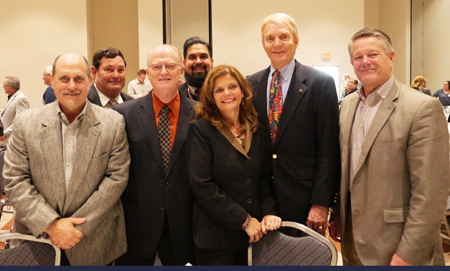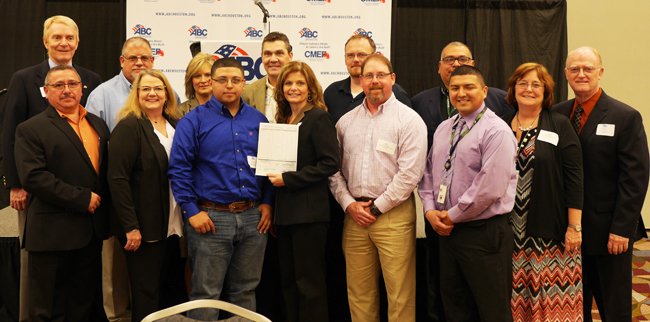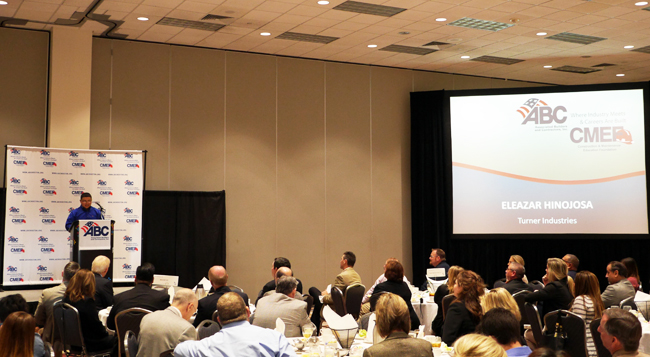 Determination, dedication and diligence…
Determination, dedication and diligence…
Those words seemed to be the trending topic amongst industry leaders on Thursday, November 19, 2015 as construction industry and educational leaders joined together at the ABC & CMEF Workforce Development Luncheon held at the NRG Center in Houston, Texas. Their goal, you may ask? To inform fellow Houstonians about current workforce development activities, construction career opportunities and the benefits of the NCCER curriculum.
The presenters list included Michael Gremillion, Vice President—Houston Office, ISC Constructors, LLC; Mike Holland, Chief Operating Officer for Marek; Donnie McCoy, Senior Operations Manager at Austin Industrial; Renea Dillon, Director at Goose Creek Consolidated ISD and Career & Technical Education Principal at the Stuart Career Center; Ezequiel Garcia, CTHS CTE Department Chair and Welding Instructor at Pasadena ISD; and Eleazar Hinojosa, Fabrication Division Welder at Turner Industries Group.
It is no mystery to those within the industry that there is a shortage of skilled workers, and according to US Census data, from 2012 to 2013, Houston was second in population growth behind New York, this shortage has the potential to derail future growth plans. CMEF has been actively engaging many schools by sponsoring 33 high schools and five college campuses with industry standards certifications, career fairs, and more.
Inspiring youth and young professionals to consider a career path in the construction industry is part of the battle. Without willing participants, there would be no students to teach, no apprenticeships to give and no development to be had. The industry is focusing on engaging youth early on in their decision process in hopes of continuing to cultivate innovation and keep the field moving forward.
Sparking the Fire then Fueling the Flame in the Classroom
How does one encourage students to build careers in construction? You get them informed. One of the biggest hindrances of student awareness about the vitality of the construction industry is the lack of information presented to them.
Presenter Michael Gremillion, ISC Constructors, LLC, Vice President, said it the best, “If you don’t tell them about it, how will they know?”
There are approximately 42,700 students enrolled in Career and Technical Education (CTE) courses in the Houston Independent School District (HISD). Passionate and informed educators are some of the best tools in the industry’s arsenal.
“This is my ninth year teaching and I love my job,” said Ezequiel Garcia, CTHS CTE Department Chair and Welding Instructor at Pasadena ISD. “It was vey tough in the beginning, you’re dealing with a different kind of young adult, they are ahead of the curve because they know which pathway they want and are here to start doing that.”
Garcia further explained that when middle school students come to visit and meet with instructors and other students, they are excited about the programs and the possibility of developing a skill that can get them into a sustainable career without accruing major debt before their 21st birthday.
Many construction industry related CTE programs, such as the five offered at Goose Greek ISD, are focusing on core curriculum, safety and NCCER training in efforts to fully prepare students for what they will encounter once they join the workforce. In addition to that, partnering with local companies to provide in-classroom engagement with industry leaders is important to their development.

“We work with many construction and maintenance companies such as Austin Industrial, Covestro LLC, CBI, Turner Industrial and Jacobs, to provide internships, professional development and in-classroom experiences of what to expect on the job,” said Renea Dillon, Director at Goose Creek Consolidated ISD and Career & Technical Education Principal at the Stuart Career Center.
The importance of NCCER accreditation is being engrained throughout the industry, and educators and employers understand how that will shape the students’ pathway. Accreditation provides the necessary skills and knowledge that help individuals and firms succeed. Garcia mentions during the discussion that he personally infuses NCCER training in the daily activities within the classroom. He believes it’s necessary for students to not only know industry concepts and terms but, how to apply them.
Both educators made two strong points about developing the workforce. One point was how educators and industry leaders have to work hand-in-hand to achieve industry goals.
“The internships and donations made from the businesses are amazing and so beneficial to students,” said Garcia. “Those things keep our programs on the cutting edge and competitive by allowing our students to do exactly what professionals in the industry are doing.”
The second point was how important it is to encourage students to stick with the programs, especially as the difficulty level increases in each course because this career path requires dedicated individuals.
“I tell students that the sky is the limit in this industry. The more you push yourself, train and study, the better chance you have for a lucrative, forward-moving career,” said Dillon. “You’re not just taking a course for today or the semester, your taking something that will impact the rest of your life.”
Commercial and Industrial Contractors join Forces
While some of the presenters are busy inside the classroom, others are working to grow the workforce from within their businesses. Similar to educators, industry professionals are passionate about the workforce, which makes developing programs for future craft workers and budding professionals a no-brainer.
“I’m passionate about the workforce and what I do. I think that it’s the most important resource that Marek and the industry has,” said Mike Holland, Chief Operating Officer for Marek. “Ironically, the craft worker is the one left out the most.”
Holland further explained that there are many other careers in the industry that get more exposure, and are great to pursue; but many individuals in, and outside the industry forget that these careers ere built around the craft worker. The men and women who build and turn ideas into a reality are the lynchpins. Without the craft worker, many of those other professional careers would not exist in the industry.
Donnie McCoy, Senior Operations Manager at Austin Industrial is a product of college training and OTJ (on the job training). He spoke to the importance of students taking the time to fully explore the various pathways available to them and select the one that fits them best, not the one that most people are choosing.
“I worked on two ranches while in college, worked within the industry during the summers and took semesters off from college to work at Texaco Chemical Plant,” McCoy said. “Once I graduated college, I looked at the pathways available to me and decided to take what the construction industry was offering versus using my college degree.”
Both Holland and Gremillion spoke about the opportunities that their respective companies offer to high school students. Gremillion mentioned that ISC is the sponsor for the electrical program at Pasadena ISD and is interested in sponsoring more electrical programs at other schools. The company offers jobs to every graduating senior upon completion of their program. Marek on the other hand offers two tracks for students to pursue with the company.
“At Marek there are two tracks: craft track which allows students to come into Marek’s Workforce Development Program as a trainee and follow a structured OJT program based off of NCCER curriculum,” said Holland. “The other option is on the professional side and is our Estimator Project Manager position.”
Holland and Gremillion spoke to the importance of proper training, company involvement in the classroom and the promoting of practicing a safety state-of-mind work ethic. “Training is a step to performance,” said Holland. “Our industry needs results and not just trained people.” Students need more than just an understanding of the craft, they need job readiness preparation to truly perform and produce results in any position, which is something companies can assist with.
“Students need to be taught how to act on the job—how to communicate in a team, time management, ethics,” said Gremillion. “Educators and Employers should not assume these traits were naturally acquired, these are learned behaviors.”
Holland, Gremillion and McCoy believe that the work they put into these programs and education really does make a difference in the lives of these students.
The finished product
Eleazar Hinojosa, Fabrication Division Welder at Turner Industries spoke from personal experience on the benefits of education and practical training as a high school graduate and recent hire in the construction industry. Hinojosa attended one of the Construction Career Expo’s hosted by CMEF. During high school, he acquired an internship with Turner Industries through the Construction Careers youth Committee (CCYC) program, which is sponsored by Turner Industries, and upon gradation was offered a full-time position.

Hinojosa stressed how grateful he was to have studied in a program that tried to replicate a real-world experience of his career in the classroom. The transition from classroom to workforce seemed natural and seamless to him. For many students like Hinojosa, it is understood, that it takes more than just one element to continue developing the workforce. Eleazar explained that he hopes educators see the great opportunities a construction career can offer and that they will look at the career advancement he has had in six months and offer opportunities to high school students to have the same success.
“I’ve been studying and practicing welding since I was a sophomore in high school,” said Hinojosa. “Without the help of ABC, CMEF, my teachers, and Turner Industries, I can’t saw that I would not have been able to achieve my goals, but with their help I feel that I was able to achieve so much more.”


